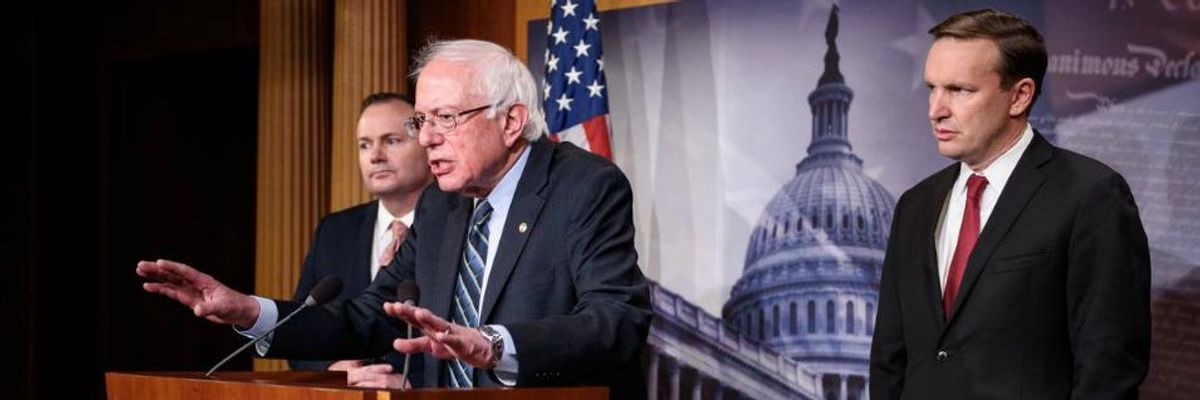Sen. Bernie Sanders on Monday called on his fellow members of Congress to come together and override President Donald Trump's veto of the historic Yemen War Powers resolution.
"The president's action is a very serious challenge to congressional authority that demands a response," the Vermont senator and 2020 presidential contender said in a dear colleague letter.
The Yemen resolution aims to end U.S. complicity in the world's worst humanitarian catastrophe. Its passage of the House and Senate marked the first time Congress has invoked the 1973 War Powers Act.
"The president's action is a very serious challenge to congressional authority that demands a response."
--Sen. Bernie Sanders
"For far too long Congress, under both Democratic and Republican administrations, has abdicated its constitutional role with regard to the authorization of war," added Sanders, the lead Senate sponsor of the Yemen measure. "The Congress must now act to protect that constitutional responsibility by overriding the president's veto."
Trump's veto of the bipartisan Yemen resolution last week, as Common Dreams reported, was widely denounced by anti-war groups and progressive lawmakers.
In a statement following the president's veto, Congressional Progressive Caucus co-chairs Pramila Jayapal (D-Wash.) and Mark Pocan (D-Wis.) said Trump "signed the death warrant of countless innocent Yemeni men, women, and children."
"Congress refuses to accept the president's decision to condemn Yemeni civilians to unspeakable suffering and carnage," Jayapal and Pocan said. "Despite this setback, the Progressive Caucus will pursue every legislative means of ending this immoral conflict, including a possible vote to override the president's veto."
The Senate passed the Yemen resolution last month by a 54-46 vote. With every senator in attendance, the resolution would need 67 yes votes to override the president's veto.
In the House--where the resolution passed 247-175 earlier this month--the resolution would need 290 votes.
Sanders urged senators who support U.S. military intervention in Yemen to "bring that perspective to the floor of the Senate, debate the issue, and call for a vote."
According to the humanitarian group Save the Children, at least 85,000 young Yemeni children have died of starvation over the past three years as a result of U.S.-backed Saudi bombing. The United Nations said last October that half of the population of Yemen is on the brink of famine.
"At the end of the day, however," concluded the Vermont senator, "let us agree that it is imperative that Congress reaffirm the power given to us by the Constitution over matters of war, one of the most serious duties we have as members of Congress."
Read Sanders's full letter:
Dear Colleague,
On April 16, President Donald Trump used the second veto of his presidency to reject the Senate Joint Resolution directing the removal of United States armed forces from the Saudi-led intervention in the Republic of Yemen. This resolution was passed in the Senate on March 13, 2019, by a bipartisan vote of 54-46, and then in the House on April 4 by a bipartisan vote of 247-175.
I am writing to ask for your support for over-riding that veto.
The president's action is a very serious challenge to congressional authority that demands a response.
Article I, Section 8 of the Constitution states clearly: "Congress shall have power to... declare war." While the president has the authority over the conduct of war once it has been declared, the Founding Fathers gave the power to authorize military conflicts to Congress, the branch most accountable to the people.
Under the War Powers Act of 1973, the assignment of a member of the United States armed forces to "command, coordinate, participate in the movement of, or accompany" another country's military during a war constitutes the introduction of the United States into a conflict. Our military involvement in the war in Yemen, which has included logistical and intelligence support, as well as aerial refueling of Saudi war planes, clearly meets this definition.
For far too long Congress, under both Democratic and Republican administrations, has abdicated its Constitutional role with regard to the authorization of war. The historic passage of this resolution, the first time since the 1973 War Powers Resolution was passed that it has been successfully used to withdraw the United States from an unauthorized war, was a long overdue step by Congress to reassert that authority.
The Congress must now act to protect that constitutional responsibility by overriding the president's veto.
I respect that some of you voted against the resolution and that some of you support our intervention in that war. If you feel that way, bring that perspective to the floor of the Senate, debate the issue, and call for a vote.
At the end of the day, however, let us agree that it is imperative that Congress reaffirm the power given to us by the Constitution over matters of war, one of the most serious duties we have as members of Congress.
I ask for your support in this effort.

